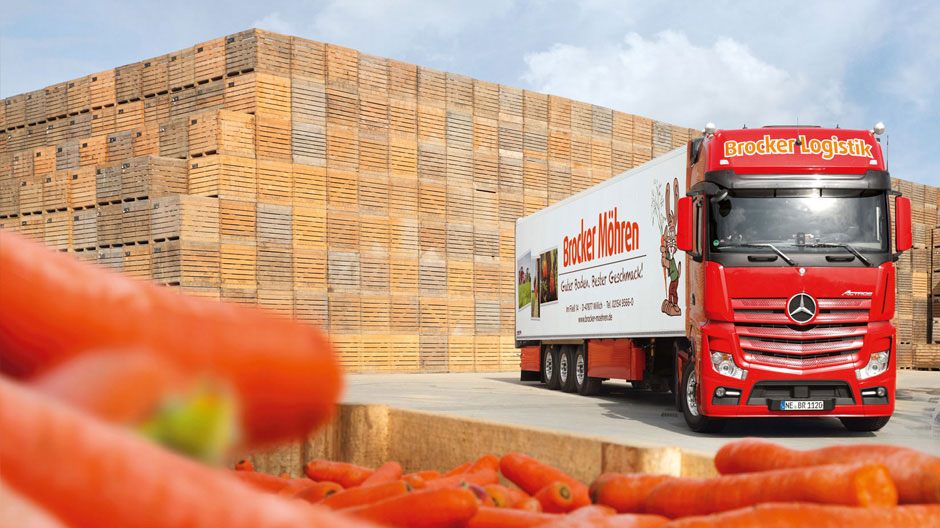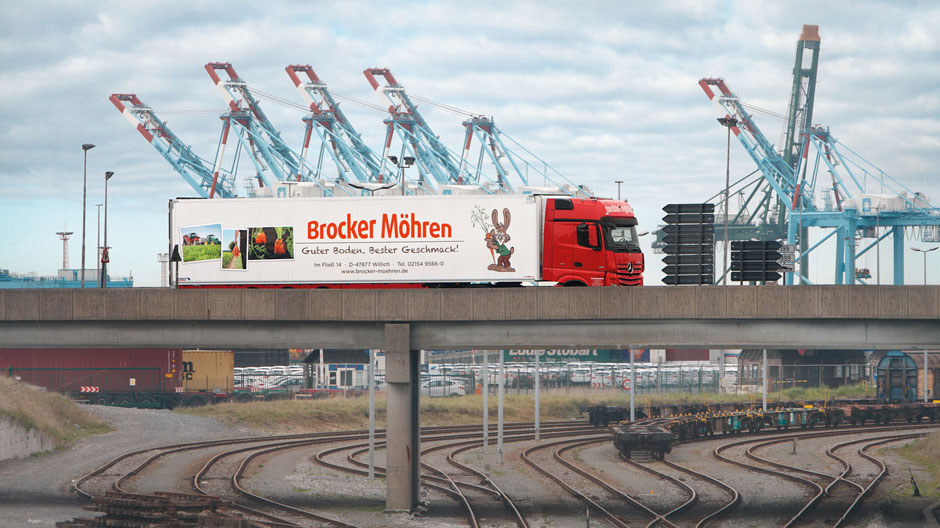
Master of efficiency: Brocker Logistik
Business & Logistics
Transport operators all over Europe are boosting their efficiency with the support of Mercedes-Benz Trucks. PPC and FleetBoard are just two examples of how this is achieved. No other manufacturer offers such a wide array of technologies and services to enable greater profitability. Leading carrot producer Brocker has to work to a tight budget and is investing in their vehicle fleet.
The machines used to wash and scrub the carrots have done a great job. Just a few minutes after looking like they’ve just arrived from the fields, with the soil still clinging to them, they look scrumptious. Those that are too small or too big, bent or damaged are automatically rejected by the sorting machine with its 24 cameras. Anything that slips past them is detected by the eyes and hands of the women responsible for checking quality. The carrots move through the building on a conveyor belt and disappear in bags or trays. Up to 90 tonnes per hour are packed here ready for shipment.
The Brocker Group based in Willich in Germany’s Lower Rhine region, not far from Düsseldorf, is one of the country’s biggest carrots processors. “Growing, harvesting, warehousing, processing, packaging and distribution including the entire logistics – we offer a one-stop solution,” says Hans-Jürgen Brocker, son of company founder Hans Brocker and head of Brocker Logistik. The goods are delivered to major food retailers – Rewe, Edeka and Aldi for example.
The carrot is not an expensive product. One weighing 100 grams is worth on average five cents. It’s the large quantities that earn the money. The Brocker Group processes 100 000 tonnes per year. Farmers grow conventional carrots on an area of 1 000 hectares and organic carrots on 500 hectares.
The Brocker Group has numerous levers at its disposal to optimise the carrot business – at the production stage right through to distribution. “Particularly as the carrot has only little value itself, we invest in everything that improves productivity and efficiency. In each individual field of activity, we use the most effective and best technology,” explains Brocker. “We grow on the best soil, as that guarantees the best taste. We buy the best seeds, the best tractors for tillage and the best technology for the refrigeration facilities and we invest in the best trucks. Only with this top-quality overall package can we satisfy our demanding customers, who trade in food, in every situation.”
14 Euro VI Actros 1851 trailers with reefer trailers were added to the fleet of the haulage company Brocker Logistik GmbH + Co. KG, which became independent at the beginning of the year. It is based in Korschenbroich-Glehn. Just a few kilometres from Willich, the company took over and completely renovated a logistics centre in 2011 with office premises, 14 loading bays, 18 cold rooms and a roofed area of 125 000 square metres. From here, up to 7 000 trips are operated per year in Germany, Holland, Belgium and France. From Aachen to Zwickau, Amsterdam to Zeebrügge – the company’s own carrots account for 70% of the freight on board the Brocker trucks, which are brought to headquarters or delivered to customers. The rest are third-party goods, as business includes the warehousing, picking and distribution of other retail products. And the fleet only operates profitably if there is sufficient return freight, for example, sometimes a Brocker refrigerated rig brings 20 tonnes of cat litter to Belgium on the return journey from a central supermarket depot in southern Germany.
In order to find the vehicles that are best for his fleet in every respect, Brocker conducted a series of tests with different engine power ratings. He opted for the Actros 1851 with its impressive output of 375 kW. “We often have tight schedules and full loads, so we need power on the inclines,” says Hans-Jürgen Brocker. “The drivers are absolutely fascinated by the specifications, the driving dynamics and the entire appearance of the vehicle.”

Carrot power. Brocker’s carrots are harvested along with the surrounding soil, transported in wooden containers with a capacity of 1 000 kilograms and stored in refrigerated warehouses at a temperature of one degree Celsius. This keeps the carrots fresh for months.
Although the fleet now consists of 36 trucks, Brocker doesn’t operate a workshop of his own. “We prefer to rely on the Full Service Package from CharterWay Service. It keeps the fleet costs clearly predictable for us at all times. And makes it transparent for me how much each specific haulage assignment is actually earning.”
This only works of course if fuel consumption is very closely monitored. Each Brocker truck does an annual mileage of about 200 000 kilometres. Diesel is the company’s biggest cost factor. The carrot fleet, that means the tractor units and the refrigeration units of the semitrailers, consume an aggregate 2.1 million litres per year. The annual average for Brocker’s New Actros is a good 27 litres per 100 kilometres (10.46 mpg).
Brocker has done some real saving by using the Predictive Powertrain Control system (PPC): “The consumption levels fells by around 2% straight away. Once drivers have familiarised themselves with the system, those figures are even higher.”
Brocker spares no effort when it comes to boosting efficiency. His vehicles are fitted with Michelin energy saving tyres. Additional headlights or bull bars – which used to be quite commonplace – are now no longer fitted. “In the near future, we will also have no horns on the roofs, as they are bad for aerodynamics,” says Brocker. In order to further minimise drag, the new Brocker semitrailers have full fairings. And as the driver is the most important determining factor by far for fuel consumption, Brocker organises regular eco-training.
The company also makes use of FleetBoard. “I wouldn’t want to miss it,” says the 43-year-old. “We receive exact data on driving style, consumption and wear. On top of that, we intend on linking up the system to our haulage company software, which will open up new opportunities to further improve efficiency.”
The be-all and end-all of business success however is the carrot. Hans-Jürgen Brocker’s grandfather Matthias started growing the plant in the 1950s and his father Hans founded the Brocker Group in 1962. “The carrot is all we’ve got and we treat it with great care. Without it, we’d have to shut down our business,” says Brocker. Laboratories test every field in which the roots grow for the company.

Eleven months a year, Brocker supplies carrots that the company produces itself, whereas the organic carrots are supplied for six months. Imports from Israel, Portugal or Spain fill the gap. “We only process carrots from abroad if German ones are no longer available,” says Brocker. At a temperature of one degree Celsius and a humidity level of 90% they are stored in wooden crates in the company’s cold storage facilities, which have photovoltaic installations on their roofs. The carrots usually still have soil clinging to them. This keeps them crispy and fresh longer. “This simulates to the carrot that it is still planted in the ground,” explains agricultural engineer Peter Bohley, who is Quality Manager at Brocker. The water from the washing facility is collected and cleaned. 98% of it is then recycled into the company’s network.
Brocker offers violet carrots, pale yellow ones, miniature-sized ones and, of course, the classic orange-coloured carrots. They all have one thing in common: not only do they taste good, they are healthy too. They are rich in vitamin B and C as well as provitamin A and carotene, which gives the carrot its colour. That is probably the reason for its popularity: following the potato, tomato and onion it is Germany’s fourth most popular crop. On average, every German eats a good six kilograms per year, and consumption is slightly increasing. Very much to the liking of Hans-Jürgen Brocker.



Comment
Please log in to post a comment.
No comments yet